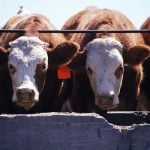A new World Trade Organization draft text, laying out what WTO member countries might be able to agree to in coming weeks on agricultural trade, shows progress on issues important for Canadian ag exports, according to Agriculture Minister Gerry Ritz.
The WTO’s agriculture negotiations chairman, Crawford Falconer, and its non-ag market access chairperson, Don Stephenson, circulated their latest draft modalities text on Friday.
The text, according to a statement from the WTO, is the chairmen’s judgments of what governments might be able to agree to, based both on what member states have proposed and debated in over seven years of trade talks, and on their responses to the chairs’ previous papers.
Read Also

China seeks improved ties with Canada amid rising trade tensions
China called on Friday for steps to improve bilateral ties with Canada, saying there were no deep-seated conflicts of interest, following a spike in trade tensions with many of Beijing’s Western trade partners this year.
“Therefore, these are not ‘proposals’ from the New Zealand and Canadian ambassadors (Falconer and Stephenson, respectively) in the sense that ‘proposals’ are normally understood,” the WTO stressed in its statement.
“In other words, these are not the chairs’ opinions of what would be ‘good’ for world agricultural and non-agricultural trade, but what might be accepted by all sides in the negotiations.”
Ritz agreed in a statement Friday that “while the text does not reflect a consensus among WTO members, it gives us something to react to in our efforts to advance the talks in Geneva.”
That said, Ritz added that the ideas raised in the text show progress toward goals important for Canada’s farmers and exporters, such as reductions in trade-distorting domestic supports, improved market access and an end to export subsidies.
“At the same time,” Ritz said, “Canada continues to have very significant concerns with the ideas in the text on sensitive products. The ideas outlined in this paper are not consistent with Canada’s firm position on this issue.”
Ritz earlier this week announced “special agricultural safeguards,” as allowed under the current WTO agriculture agreement, for Canada’s supply-managed dairy, poultry and egg production, which it has deemed “sensitive.”
Canada “maintains its firm opposition to any tariff cuts or tariff quota expansion for sensitive products,” Ritz said in his statement Friday. “This represents a fundamental element of Canada’s negotiating position.”
Canada’s dairy, egg and poultry producers agreed in a joint release Friday, calling it “unconscionable to gamble on a text that would have measurable negative economic impacts on Canadian agriculture.”
“A ‘one-size-fits-all’ approach to these negotiations will not allow the WTO to reach an agreement,” David Fuller, chair of the Chicken Farmers of Canada, said in the release. “We’d hoped that countries’ special needs would be addressed in a thoughtful way. We are concerned that Chairman Falconer has done this for some countries, but not for Canada.”
The dairy, egg and poultry groups said in their release that Falconer’s text on sensitive products “treats such products more harshly than ever.”
“The government must work to ensure that all supply-managed products are included in the sensitive products category, without having to pay an additional cost,” the groups wrote. “The government must also negotiate to make certain there are no reductions to over-quota tariffs for sensitive products and no increases in market access.”















